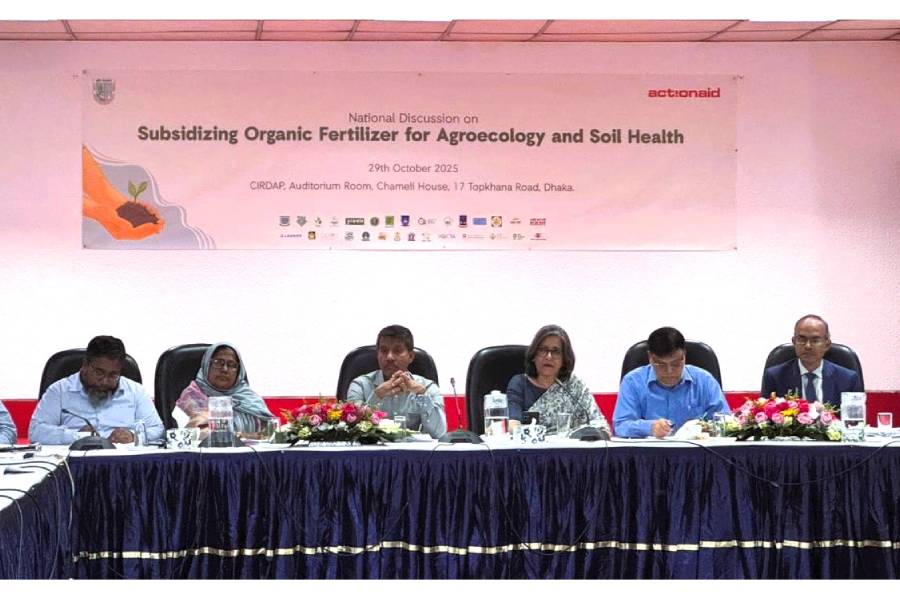Experts urge subsidies & incentives on Organic Fertiliser to Protect Soil Health & Crop Health

Published :
Updated :

Agricultural experts and policymakers have emphasised the urgent need for subsidies and incentives to promote the use of organic fertilisers in order to protect soil and crop health.
They urged the government to take concrete measures without delay, according to a press release.
The remarks came at a roundtable discussion titled ‘Subsidising Organic Fertiliser for Agroecology and Soil Health’, jointly organised by ActionAid Bangladesh and the Bangladesh Agricultural Research Institute (BARI), along with 29 co-organising institutions, held on Wednesday (29 October 2025) at the CIRDAP Auditorium in Dhaka.
Speaking as the Chief Guest, Dr Mohammad Emdad Ullah Mian, Secretary of the Ministry of Agriculture, said, “We are rethinking the approach to organic fertiliser and working on a roadmap to determine how coordinated investment can be made in this sector.”
He added, “Ensuring food security and addressing real-life challenges is our collective responsibility. A long-term national plan up to 2050 is currently under implementation, where all relevant ministries and stakeholders have the opportunity to work together in a coordinated manner at divisional and district levels.”
The Secretary further informed that about 70 per cent of the total agricultural budget is allocated for subsidies, of which around 80 per cent is spent on chemical fertilisers.
The government aims to reduce chemical fertiliser use by 32–35 per cent while increasing the use of organic fertiliser.
However, he stressed the importance of maintaining a strong registration and monitoring system to prevent misuse and ensure balance.
During the discussion on challenges and policy recommendations, Dr Nazim Uddin, Senior Scientific Officer at BARI, proposed providing incentives or subsidies of BDT 5,000 per tonne of organic fertiliser.
He stated, “Although Bangladesh’s agriculture sector has achieved remarkable growth over the past five decades, its heavy dependence on chemical inputs has led to soil degradation, loss of biodiversity, depletion of groundwater, and reduction in the nutritional value of food. These challenges are increasingly threatening the long-term stability of agriculture and food security.”
He added that Bangladesh’s demand for organic fertiliser currently stands at 6–6.5 million tonnes, while over 75 per cent of the required raw materials are already available within the country. With proper initiatives, it is possible to meet the entire national demand.
According to Dr Nazim Uddin, implementing such an initiative could create around 370,000 new jobs across 14,000 agricultural blocks by mobilising rural youth entrepreneurs. It would also strengthen the livestock sector, boost rural economies, and help reduce migration. The measure would further contribute positively towards achieving the global ‘net-zero’ target in soil management by 2050.
Dr Samia Sultana, Director General of the Soil Resource Development Institute (SRDI), underscored the importance of promoting organic fertiliser, saying, “There is no alternative to organic fertiliser when it comes to protecting soil health. To safeguard both soil and agriculture, greater emphasis must be placed on the production, marketing, and use of organic fertiliser alongside chemical fertiliser.”
Speakers also called for ensuring the participation of youth and women in agriculture and encouraging entrepreneurship based on organic materials.
They stressed strengthening research and innovation in eco-friendly agricultural practices, enhancing awareness and extension services, and fostering strong coordination among government, private, and research institutions.
The roundtable, moderated by Farah Kabir, Country Director of ActionAid Bangladesh, was also participated by Dr Shahidul Islam (former Director General, BARI), Rezaul Karim Siddique Rana (General Secretary, B-SAFE Foundation), Dr Latiful Bari (Chief Scientist, Centre for Advanced Research in Sciences), Dr Monowar Karim Khan (Soil Science Society), and Fazle Rabbi Sadeque (Deputy Managing Director, Palli Karma-Sahayak Foundation - PKSF).


 For all latest news, follow The Financial Express Google News channel.
For all latest news, follow The Financial Express Google News channel.